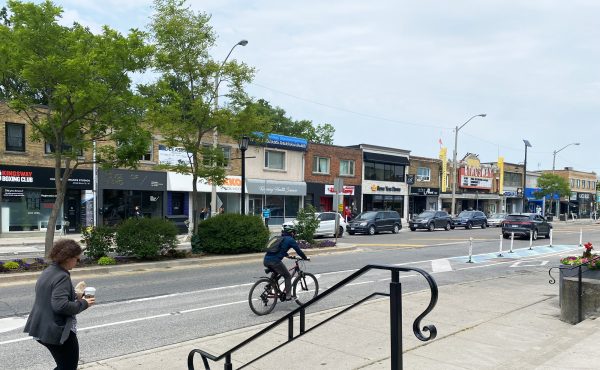
As Toronto contemplates introducing a large-scale bike-sharing program, a key decision it will have to make is whether the municipality (or a related organization or non-profit) should run the program and have it largely self-funded, or whether to outsource the management and funding of the program to a private firm — which would undoubtedly be an outdoor advertising agency.
Apparently, if the City chooses to outsource — the most common model at the moment — the right of first refusal goes to Astral Media, which secured the city’s street furniture installation and advertising contract [clarification — I was assuming here that any outsourced program will rely on advertising for funding, but conceivably the situation could be more complicated]. On the other hand, Montreal has just unveiled a municipally-controlled self-financing bike-share system run by its parking authority, Bixi, set to launch in the spring, which could serve as an alternative municipal model. (Toronto, of course, had a small-scale community BikeShare program run by the Community Bicycle Network for several years, but it is no longer operating)
In the most recent issue of Spacing (#12), writer Paul Cohen described the largest, and probably most famous, bike-share program currently in operation, Paris’ Velib’. It has been hugely popular, inspiring new forms of racing and, apparently, flirting on bikes in that city.
In his original draft, Cohen also provided a history of bike-sharing programs, from the mythical “white bike” program in 1960s Amsterdam to Velib’, charting the gradual move from community-based programs to advertising-funded ones. We had to condense it in print because we did not have the space, but here is the full account.
Vélib’ was by no means a novel idea. While Amsterdam’s fabled white bike project is commonly held to mark the birth of urban bike sharing, this two-wheeled prehistory — as romantic as its evocation of a 1960s communitarian, anarchist utopia might seem — is alas mythological. [The program was proposed by a radical city councillor but firmly rejected by the city. In the end, his movement scattered a few white bikes around the city more as a gesture than as a viable program, and they quickly disappeared].
In fact, it was the French port La Rochelle, France’s first — and, for many decades, only — city committed to environmentally progressive planning, which pioneered such experiments with its yellow bike rental program in 1974. Despite La Rochelle’s success (its project continues to operate to this day), no other cities followed suit.
A full two decades later, Copenhagen’s free bycyklen bike-loan program, begun in 1995, served as the true European catalyst, inspiring several imitators, including Helsinki (2000) and the Danish town Arhus (2005). Aveiro in Portugal launched a free bike-loan program in 2001 and the French city of Angers opened its VéloCité system in 2004. In Switzerland, where such efforts have been initiated and operated by independent, non-profit associations rather than municipalities, bike-sharing has taken a somewhat different form. The non-profit association Genà¨ve Roule has run a free-bike program since 1997, for example, and similar initiatives exist in other cities across the Confederation. Germany’s national railway has operated the Call-a-Bike rental service since 2001, now in Berlin, Frankfurt, Munich, Cologne, Stuttgart, and Karlsruhe, and the Dutch national railway offers a similar rental service. In parallel to Deutsche Bà¤hn’s service, a small firm called Nexbike is testing bike rental initiatives in several German cities. Across the Channel, Oybike has mounted a similar initiative in London.
But the real impetus for the recent spread of bike loan programs in Europe was less public-minded environmental goodwill than a ferocious private sector scramble for advertising Euros. At a time when growing numbers of European municipalities were exploring ways to promote bicycle use, the companies which sell outdoor advertising space began to propose two-wheeled rental schemes as part of their bids for cities’ outdoor billboard concessions.
Two firms battle each other for the spoils of this lucrative European market: Clear Channel, the largest outdoor advertising corporation in the world, and its leading competitor, the French company JCDecaux (which prefers to call itself a provider of “urban furniture,†and is best known for the sleek, stylish, coin-operated, self-cleaning public toilet units it maintains on Paris’s streets). Locked in a perennial contest for municipal advertising contracts, these companies sought to sweeten their respective offers in recent years by bundling them with bike-sharing systems.
Their aggressive commercial strategies thus spawned the proliferation across the old continent of systems with cutesy names and brightly painted bicycles. Rennes launched a free bike-share system under contract with Clear Channel in 1998; and when Vienna abandoned its Copenhagen-inspired initiative after it suffered widespread vandalism in only a few weeks of operation in 2000, the city awarded JCDecaux a concession for its Citybike bike-rental program. In Norway, Clear Channel concluded contracts for rental systems with four cities in 2001 and 2002 (Trondheim, Drammen, Bergen and Oslo), JCDecaux signed with Porsgrunn in 2003, and Sandnes has run its own since 2001. Amidst this rapid profusion, Lyon’s 2005 contract with JCDecaux for its Vélo’v program was a watershed. Its fleet of 2,000 bikes made it at that time the largest in the world, and attracted unprecedented numbers of users (10 % of the city’s inhabitants are subscribed today). Lyon’s success caught city planners’ attention across Europe: the following year, JCDecaux installed the Cyclocity system in Brussels and Vél’Hello in Aix-en-Provence, Clear Channel set up Stockholm’s Citybike system, the Spanish city of Burgos put in place its own free BiciBur program, and in 2007 Orléans awarded a concession for Vélo+ to the French state railway SNCF’s subsidiary EFFIA.
The key to Vélib’s unexpected success, its unprecedented scale, also came about as something of an accident. When Paris Mayor Bertrand Delanoà« decided to implement a system in Paris in the fall of 2006, he clearly had something like Lyon’s model in mind. His initial invitation for bids called for 6,000 bikes and 600 pick-up and drop-off points — had it been left at that, it would still have been the biggest in Europe, although on the same order of magnitude as Lyon’s network.
In the first round of bidding, Clear Channel beat out JCDecaux — but the French company, determined to keep a tight grip on its flagship concession on outdoor advertising in Paris, mobilized a battalion of lawyers to get the bid overturned in court. To be certain that its American rival would not beat it out a second time, JCDecaux submitted a revised offer that far surpassed what the city had imagined: 20,600 bikes and a network of 1,450 stations so dense that no point within the city would be more than 300 meters away from the nearest station. Clear Channel had clearly lost and Parisians woke up to the world’s largest bike sharing network. The new system, the unlikely fruit of intense competition for advertising market share between Clear Channel and JCDecaux rather than any ecological good intentions, now made it possible for Parisians to pick up and drop off a bicycle anytime and anywhere in Paris.






16 comments
Bike share programs work well, when the work. The problem I foresee is much like our public transit – with variuos municipalities involved it would be very difficult to get cooperation from local governments (as it so often seems to be).
The program would likely be more successful if it was run by a private firm.
(To help them get started the city of Toronto should donate all those recovered stolen bikes that were never claimed!)
I wonder if the City used TPA and TTC property for the bike stands (rather than sidewalks) whether Astral would still have right of refusal?
Here is a link to a story in the Star back in August that states a city goal to have the program up and running by Summer next year:
http://www.thestar.com/News/GTA/article/482631
The right of first refusal for a bike share program does not go to Astral Media despite what the City Solicitor has been advising people. Astral only has the right of first refusal for street furniture programs that have third party advertising on them.
Such program is not possible here in Toronto for a few reasons. The most obvious one is the lack of bike lanes in the city, another reason will be naysayers claiming our winters to be too cold for any bike programs (they would see it as a waste of money), there is also the sad fact that the city uses bike lanes to dump plowed snow in the winter, but to me the main reason is due to parking. To make a system like Paris work you need to have bike stations near walking distance from each other. Those stations take at least 3 parking spaces, here in Toronto parking is believed to be a God given right and no lost parking would be tolerated. This would infuriate drivers and we know how drivers come ahead of transit, pedestrians and definitely way ahead of cyclists in this car addicted society of ours. I don’t see it happening and if it does it will be a flop because it will not be as nearly ambitious as it needs to be.
Whatever happened to the Bike Station at Union to be ready for summer 2008? Oh right, f—- all. Just like bike lanes. This will get done, and done poorly, only if the city thinks it can sell advertising.
Rami – I was assuming that any system outsourced to a private company would rely on advertising. But when I think about it, there are conceivably situations where that would not be the case. I’ve added a clarification.
Velib’ does not include advertising, but is paid for by the billboard advertising concession for all of Paris. In Toronto, any advertising revenues have already been accounted for by the existing street furniture program, so a bike-share system would have to have some additional form of revenue sufficient to sustain it. Bixi in Montreal claims to be the first program to be self-sustaining through fees, but it won’t make a profit, just cover its costs. I’m not sure how a private company would make a profit without incorporating advertising.
Given the city government’s general lack of ability/interest/mandate/drive to accomplish major urban programs like transit, housing, graffiti removal, etc. it would be best to outsource to a third party who has a contractual obligation to perform. Otherwise you’ll end up with a stub system that never reaches critical mass and dies a scruffy, poorly-maintained death. Yes, it’s no fun that everything in life requires advertising these days but this is the Toronto we are stuck with. (i.e. cash-poor and not terribly well run.) Outsource it, and make sure there is enough ad revenue in there to make it work for them. I don’t care if every bike, bike post and bike lane is covered in ads — better to have that then no bike sharing at all.
Carl:
I could be wrong, but I don’t think Paris has a massive bike lane network either. My understanding is that Velib has created a huge influx of cyclists, which is now putting more demand on better cycling facilities.
As for winter, Montreal is starting their program next year. Toronto’s winters are very mild in comparison. Also, many of Montreal’s bike lanes get put away for the winter…
So…winter and lack of bike lanes shouldn’t have any real effect on whether Toronto gets another bike sharing system.
Velib also has user fees for renting the bikes. You need to swipe a smart credit card to unlock the bike and the first half hour is free, but you’re charged per half hour after that.
Vic, Paris actually has tons of bike lanes, they are even separated from traffic. Their main streets are much wider than ours and it is a lot easier to add bike lanes. Anyways my point is that most people in Toronto will not bike due to a lack of bike lanes, there is no way they will rent bikes to go around with all the bad drivers in our city, it takes a lot of courage to bike in Toronto. As for Winter I totally agree with you, just because it is cold doesn’t mean you can’t bike (it beats standing in the cold waiting for the streetcar), but that is the excuse people in general will use. A pretty lame excuse if you consider people will spend a whole day outdoors in the cold to ski and snowboard…
Velib’ does have fees, but they don’t cover the full cost of the program — it is bundled with the advertising concession to be viable. I believe Bixi intends to cover the full cost with fees (largely by keeping costs down through various measures).
I’ve been talking with City staff and councillors to find out what’s going on. Jonathan Goldsbie, of Toronto Public Space Committee seems to be only outside party that has a copy of most of the Street Furniture contract. City staff have confirmed to me that Jonathan is correct in saying that a program with no advertising does not have to be passed by Astral first. That means if Toronto adopts a Montreal-style self-financing system they wouldn’t have to give Astral first right of refusal.
It’s beyond me, then, why the City’s legal department advised Councillor Heaps that the City had to give to Astral, when it’s not even clear that a bikesharing system is actually “street furniture” let alone necessitates advertising. Last I heard bicycles were not furniture.
“It’s beyond me, then, why the City’s legal department advised Councillor Heaps that the City had to give to Astral, when it’s not even clear that a bikesharing system is actually “street furniture†let alone necessitates advertising.”
It was beyond many of us too when the City legal department told council that Astral couldn’t be told they had to remove all illegal billboards *before* getting the Street Furniture Contract. Then again, if the City’s bureaucracy took advertising seriously, Rami Tabello would have much more free time on his hands.
I think that regardless of the weather conditions, people will still gather enough courage to get out on a bike if it saved them a little bit of cash. And from the advertising standpoint, well I wouldn’t really care much if my bike was covered in adds. If it’s a bike that I can ride from one point to another at a low cost, I don’t care if it has adds all over it. I think that as long as it can maintain itself it will be a very successful program and help create an example for other cities to follow as well.
Yes, it’s really good one